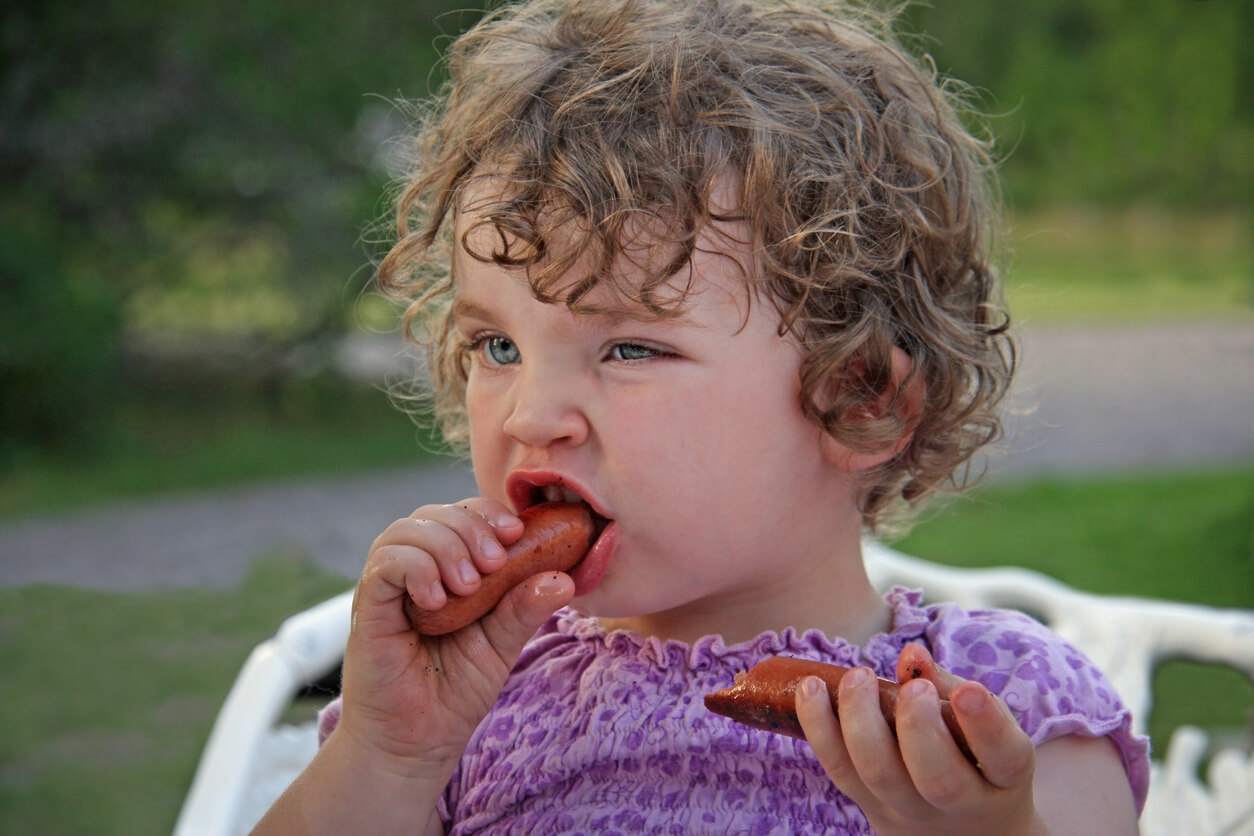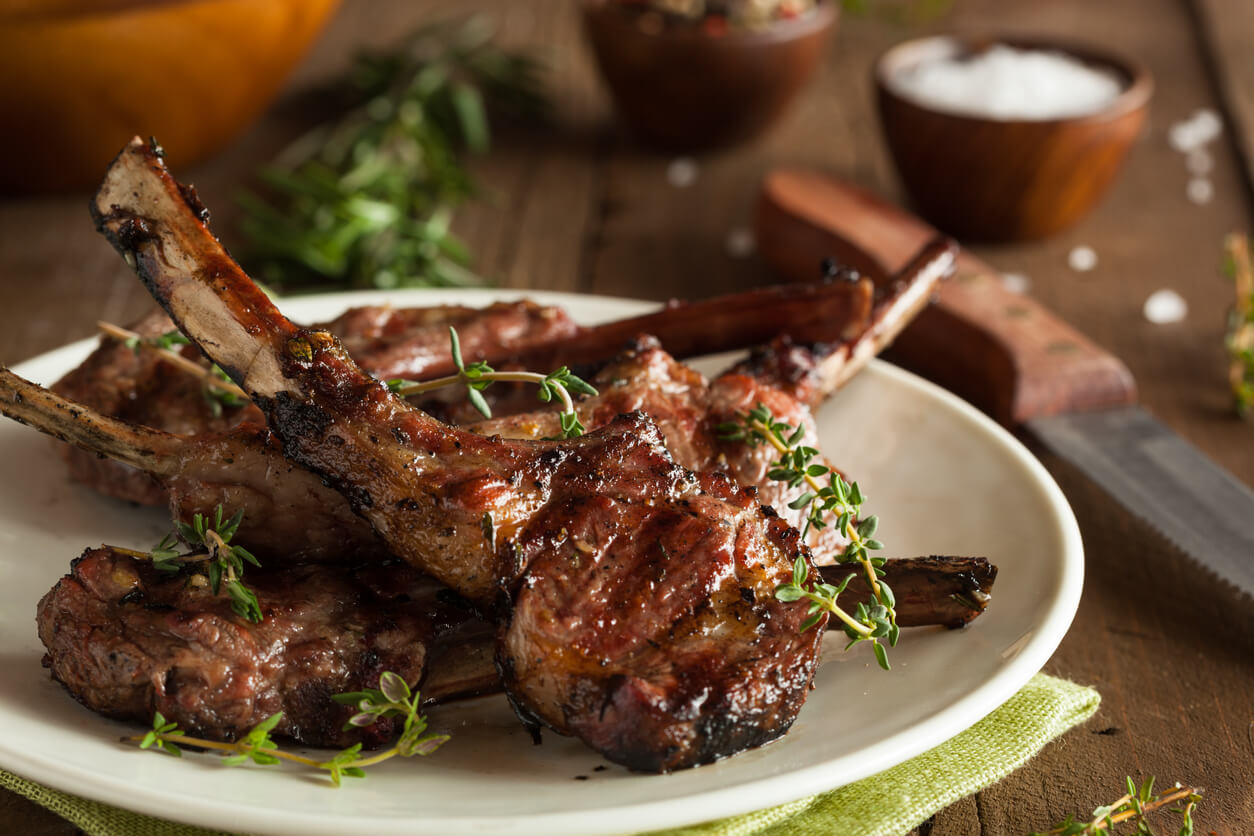6 Foods that Can Cause Choking in Children


Written and verified by the nutritionist Saúl Sánchez Arias
In the infant diet, it’s crucial to avoid introducing certain foods that can cause choking in children, especially during the first years of life. The swallowing system isn’t yet fully developed, and inefficiency could jeopardize the health of little ones.
This is one of the reasons why it’s recommended that children should always be accompanied at mealtimes. It’s good for parents to supervise the process and for someone to be with them in case of choking. That way, you can try to solve it as soon as possible.
Foods that can cause choking in children
We’re going to show you which foods can cause choking in little ones so that you can try to avoid them in the diet of younger children.
1. Peanuts
Nuts are foods with high nutritional density. However, they’re dangerous during the early stages of life because of their small size and hard nature. In addition, the risk is even greater when peanuts are eaten whole and in their skins, as in this case, they can clog the airways.
2. Sausages
Sausages are mentioned in a study published in the International Journal of Pediatric Otorhinolaryngology as a dangerous food for children. In this case, the risk of choking is increased, which can cause death in the worst-case scenario.

3. Grapes
According to a study published in BMJ, grapes are foods that can cause choking and plugging of the windpipe in children due to their size and soft consistency. For this reason, their inclusion in the diet of young children should be avoided. In addition, the presence of seeds inside could aggravate the problem.
4. Candies
Children love candies. However, these foods cause 15% of choking in children in the United States. The risk comes from the small size of these products and their hardness, which could lead to choking if they’re diverted into the windpipe. In addition, it’s possible for them to shred into smaller pieces that can end up in the airways.
5. Meat
Meat accounts for 12% of choking cases in Spain. This is due to the fact that some children have difficulties chewing it correctly. The risk is higher when we’re talking about a type of fibrous food that’s difficult to tear, which could cause blockage of the trachea in case it deviates from its correct path.
6. Pits and bones
Anything with a pit or bones is susceptible to causing choking in children. An example would be cherries. Olives can also cause problems. However, the bones of meat foods are capable of causing more than one scare in little ones. For this reason, it’s best to offer these foods already cut in order to limit the risks.

Methods to avoid choking in children
During the last few years, a method of feeding children called Baby Led Weaning has become popular. In spite of its proven benefits, it’s important to take certain precautions to avoid choking that could endanger the health of little ones. For this reason, it’s important that children are always supervised when they’re offered any food for handling and consumption.
At the same time, it’s important to avoid giving children hard and small foods such as those already mentioned. If they have bones, it’s better to cut them up and remove this part to avoid problems. In the case of preparing porridges or purees, it’s wise to make sure that the texture is completely homogeneous.
Avoiding choking is key during the first stages of life
As you’ve seen, there are several foods that could cause choking in children. For this reason, you should avoid their inclusion in the diet, as well as apply a series of preventive measures in the event that these products appear in the diet.
Remember that choking in children could be fatal, especially when it’s caused by a small, hard element, such as a bone. If this situation occurs, the best thing to do is to act quickly and go to the emergency room if necessary.
In the infant diet, it’s crucial to avoid introducing certain foods that can cause choking in children, especially during the first years of life. The swallowing system isn’t yet fully developed, and inefficiency could jeopardize the health of little ones.
This is one of the reasons why it’s recommended that children should always be accompanied at mealtimes. It’s good for parents to supervise the process and for someone to be with them in case of choking. That way, you can try to solve it as soon as possible.
Foods that can cause choking in children
We’re going to show you which foods can cause choking in little ones so that you can try to avoid them in the diet of younger children.
1. Peanuts
Nuts are foods with high nutritional density. However, they’re dangerous during the early stages of life because of their small size and hard nature. In addition, the risk is even greater when peanuts are eaten whole and in their skins, as in this case, they can clog the airways.
2. Sausages
Sausages are mentioned in a study published in the International Journal of Pediatric Otorhinolaryngology as a dangerous food for children. In this case, the risk of choking is increased, which can cause death in the worst-case scenario.

3. Grapes
According to a study published in BMJ, grapes are foods that can cause choking and plugging of the windpipe in children due to their size and soft consistency. For this reason, their inclusion in the diet of young children should be avoided. In addition, the presence of seeds inside could aggravate the problem.
4. Candies
Children love candies. However, these foods cause 15% of choking in children in the United States. The risk comes from the small size of these products and their hardness, which could lead to choking if they’re diverted into the windpipe. In addition, it’s possible for them to shred into smaller pieces that can end up in the airways.
5. Meat
Meat accounts for 12% of choking cases in Spain. This is due to the fact that some children have difficulties chewing it correctly. The risk is higher when we’re talking about a type of fibrous food that’s difficult to tear, which could cause blockage of the trachea in case it deviates from its correct path.
6. Pits and bones
Anything with a pit or bones is susceptible to causing choking in children. An example would be cherries. Olives can also cause problems. However, the bones of meat foods are capable of causing more than one scare in little ones. For this reason, it’s best to offer these foods already cut in order to limit the risks.

Methods to avoid choking in children
During the last few years, a method of feeding children called Baby Led Weaning has become popular. In spite of its proven benefits, it’s important to take certain precautions to avoid choking that could endanger the health of little ones. For this reason, it’s important that children are always supervised when they’re offered any food for handling and consumption.
At the same time, it’s important to avoid giving children hard and small foods such as those already mentioned. If they have bones, it’s better to cut them up and remove this part to avoid problems. In the case of preparing porridges or purees, it’s wise to make sure that the texture is completely homogeneous.
Avoiding choking is key during the first stages of life
As you’ve seen, there are several foods that could cause choking in children. For this reason, you should avoid their inclusion in the diet, as well as apply a series of preventive measures in the event that these products appear in the diet.
Remember that choking in children could be fatal, especially when it’s caused by a small, hard element, such as a bone. If this situation occurs, the best thing to do is to act quickly and go to the emergency room if necessary.
All cited sources were thoroughly reviewed by our team to ensure their quality, reliability, currency, and validity. The bibliography of this article was considered reliable and of academic or scientific accuracy.
- Altkorn, R., Chen, X., Milkovich, S., Stool, D., Rider, G., Bailey, C. M., Haas, A., Riding, K. H., Pransky, S. M., & Reilly, J. S. (2008). Fatal and non-fatal food injuries among children (aged 0-14 years). International journal of pediatric otorhinolaryngology, 72(7), 1041–1046. https://doi.org/10.1016/j.ijporl.2008.03.010
- Lumsden AJ., Cooper JG., (2017) The choking hazard of grapes: a plea for awareness. Archives of Diasease in Childhood, 102:473-474
This text is provided for informational purposes only and does not replace consultation with a professional. If in doubt, consult your specialist.








